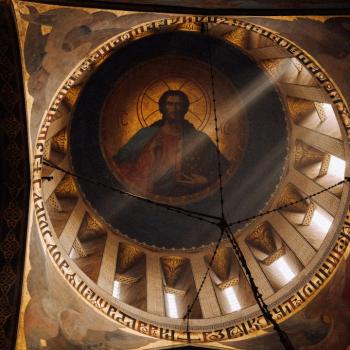The Gospel story of the rich young man is the story of someone who wanted to do good and avoid evil. When he went to Christ, he was not impressed hearing the commandments, with which he was already familiar. Christ does not condemn him for his decision to walk away, but the Gospel author makes sure to note that he “went away sad” (Mk. 10:22). If we do not rise to the occasion to live out the Gospel, we will be like this rich young man–unenthusiastic and unexcited about Christian living.
Temptation to be Sad
This powerful encounter between Christ and the rich young man shows us we should shake off the temptation to be sad and discover the beauty of following Christ. Giving up everything to follow Christ is exciting and deeply satisfying. Throughout the centuries, we have had men and women who do this and find tremendous happiness. We call them “saints.” An early testimony of Christian living comes to us in the “Letter to Diognetus.” When the author describes the Christians, he focuses on their “otherness” yet discloses his deep admiration for them.
And yet there is something extraordinary about their lives. They live in their own countries as though they were only passing through. They play their full role as citizens, but labor under all the disabilities of aliens. Any country can be their homeland, but for them their homeland, wherever it may be, is a foreign country. Like others, they marry and have children, but they do not expose them. They share their meals, but not their wives. They live in the flesh, but they are not governed by the desires of the flesh (“Letter to Diognetus”).
Live Differently
Even though the author of the Letter to Diognetus sees Christians foregoing many earthly pleasures, he does not describe them as unhappy. We too, like these early Christians, can live differently from the populace yet find deep happiness. Instead of giving in to the temptation to blend in and lose our identity, we can embrace our identity and proclaim the truth to a lost and lonely world. If we are going to live up to the legacy of our ancestors, we have to do our best to always defend family values and life. This month of October being Respect Life month gives us an especially important time period in which to do this.

Serving as Stepstools
Why should we bother to point out the errors of our times? Does doing so imply we think that we are better than others? No, it does not—rather, in doing so we recognize that anything we know and understand is due only to the grace and love that Jesus gives us. A lot depends on whether we think we need pedestals or stepstools. The temptation with a pedestal is to raise ourselves up for the admiration of others. A stepstool, on the other hand, is a humble tool. If we see ourselves as stepstools to help others out of the mud that fills our hopeless world, we are at no risk of becoming too full of ourselves. We remind the world of the spiritual nature of reality that cannot be lost. So many people discuss moral issues in a merely deterministic and materialistic way. God wants more than that. He wants to use us to wake up consciences.
To speak in general terms, we may say that the Christian is to the world what the soul is to the body. As the soul is present in every part of the body, while remaining distinct from it, so Christians are found in all the cities of the world but cannot be identified with the world. As the visible body contains the invisible soul, so Christians are seen living in the world, but their religious life remains unseen (“Letter to Diognetus”).
Willing to Serve
We should stand out for our willingness to serve and our humility. Following Christ has practical consequences in the way we think, speak, and act. We are called to promote good and oppose evil, and the same applies when we vote. Without telling us what to vote on which issue or naming which candidates for whom we should vote, the United States Bishops remind us how to promote good and oppose evil when we carry out our civic duty.
Some might be tempted to say: yes, of course, we will be the ones who help by promoting good and opposing evil. But when confronted with so much good at risk and so much evil, it is a great challenge to avoid fear and anger. The threat of abortion remains our pre-eminent priority because it directly attacks our most vulnerable and voiceless brothers and sisters and destroys more than a million lives per year in our country alone. Other grave threats to the life and dignity of the human person include euthanasia, gun violence, terrorism, the death penalty, and human trafficking. There is also the redefinition of marriage and gender, threats to religious freedom at home and abroad, lack of justice for the poor, the suffering of migrants and refugees, wars and famines around the world, racism, the need for greater access to healthcare and education, care for our common home, and more. All threaten the dignity of the human person (USCCB, “Forming Consciences for Faithful Citizenship – Introductory Note”).
We want to promote good and avoid evil. We can begin by standing up for the dignity of the human person and giving testimony with our lives. When we stand up for human dignity, we stand with Christ.
Subscribe to the newsletter to never miss an article.

















